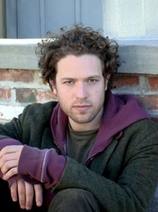Stefan Merill Block (website) wrote a very lyrical book called “The Storm at the Door” (book review) which I found fascinating. The subject matter were the lives of Mr. Block’s grandparents, however the story he tells is fictional, more likely a family-historical fiction type. Mr. Block was kind enough to answer my questions with very thought provoking responses.

Q. Did you have some trepidation writing a novel about your grandparents?
A. Actually, much more than anything I’ve written before or since, this felt like something I absolutely had to write. The loss of my grandparents – particularly the loss of my grandfather, whom I never met—has always haunted me. My grandparents continue to feel so present in my family and in my own life, and they have been gone for decades. This book came out of an urgency I have always felt, the need to know them. At first, I thought of this book as a non-fiction project, and I tried to approach it as a journalist, with interviews and research. But, eventually, I saw that what I really needed to know was something that only an act of imagination could deliver. The facts of their lives weren’t enough; I needed to know them as living people. Once I knew I was writing fiction, I felt much freer and less trepidatious to share this story with others. It is, in the end, only a fiction inspired by real people, like so many novels.
Q. How did your family react to the book?
A. My family has been incredibly generous and supportive throughout the writing process. My mother was this book’s first reader, and her comments helped shape and improve every page. Ultimately, it is my name on the cover, and the characters are mostly products of my imagination, but it was my family’s insight and help that made it possible to write.
Q. Even though “The Storm at the Door” is a novel, it seems intensely personal (besides being a creation). Was it more difficult write than other novels which are less personal?
A. In some ways it was much easier and in others much more difficult. Since I was a kid, I’ve been imagining my grandparents; they were my first fictional characters. And so, when I finally came to write this book it was a bit like cheating, just putting to the page these characters who existed for me long before I was a writer. The personal urgency of this project also helped propel me through the pages and rewrites. But still there was the unavoidably difficult work that goes into any novel: the unending and febrile labor of crafting a coherent story in interesting language. And because this story had so much personal importance for me, the work of crafting this novel was a particularly long and often painstaking process.
Q. Did you find anything that shocked you in your research into psychiatric institutions?
A. Most of my research was focused on McLean Hospital, the actual hospital where my grandfather was a patient. For 200 years, McLean has been one of the country’s most famous mental health facilities and also one of the wealthiest. For the most part, I’m impressed by the history of the earnest and humane efforts of the doctors and caretakers there. But one of the fascinating things about studying that history was to see how society’s understanding of mental illness resulted in so many different misguided modes of therapy. In the 1960s, for example, talk therapy dominated, and it seems to have been the belief of the Psychiatrist in Chief of that time that any mental disorder, catatonic schizophrenia included, could be cured by intensive conversation. Of course, that idea seems ridiculous today, but it also makes me think that our present approaches to psychopathology are probably limited in ways that will seem antiquated and possibly even silly a few decades from now. The history of mental health care is a sad but heroic one, of sincere but faltering attempts to elucidate and cure these profoundly obscure and complex disorders.
Q. What are the challenges of book promotions in the social media age?
A. A writer’s access to readers is now at an unprecedented state of ease and intimacy, and I think that is mostly a wonderful thing. And it works both ways: through sites like goodreads, librarything and amazon, actual readers have unprecedented power to influence the fate of a book’s reception. All of this is thrillingly democratizing, but it can also be distracting to the project of writing. I firmly believe that good writing demands quiet and solitude and focus. Like many writers, I use the “Freedom” application to disable the internet while I work, and I try my hardest not to let all the online talk and opinions distract me from what it is I’m trying to produce. Still, the internet is like a raucous party always going on just beneath my apartment: sometimes it’s thrilling, sometimes it’s annoying, and it’s impossible to stay away from it for long.
Shameless plug disguised as a wise ass question: Why do you love ManOfLaBook.com so much and often visit the website?
Wise guy answer: There are no sufficient words! It’s like a great love affair; I’m simply powerless to its draw.
Thanks for Mr. Block for taking the time and answer my questions.
Zohar – Man of la Book
Related articles
- All My Fiction (the-time-capsule.com)
- Writing Biographies for Kids (jhunsickerwrites.wordpress.com)
- Think piece: Literary Fiction v. Genre Fiction (barnsleywriters.wordpress.com)
- Hell is not other writers (writeanything.wordpress.com)



One Comment
Great interview, particularly the question regarding the changing role of the author. China Mieville addressed the same issue last year, and noted that authors are required more and more to become media machines or personas rather than people who write books.
I read and thoroughly enjoyed Merill Block’s The Art of Forgetting last year–he’s definitely an author to watch.